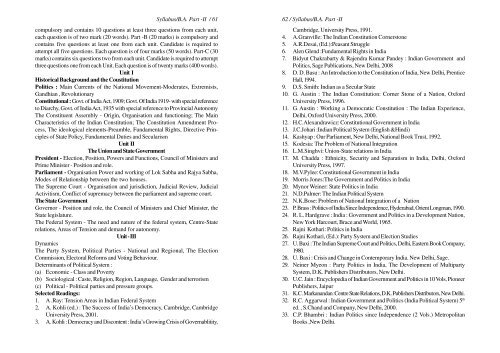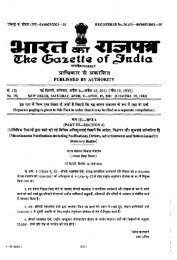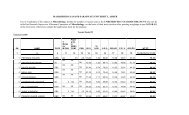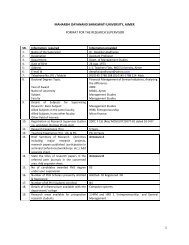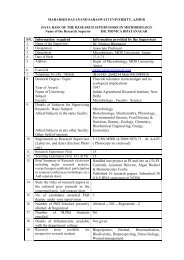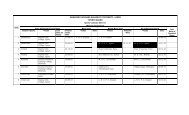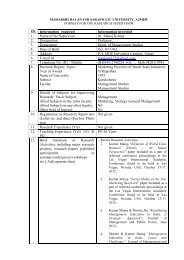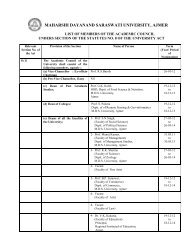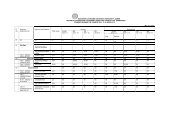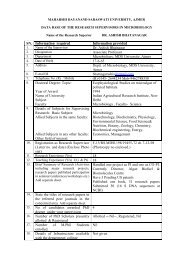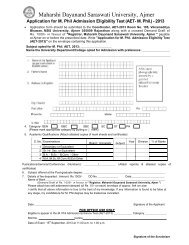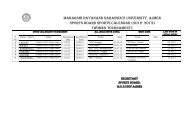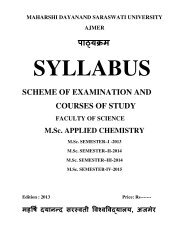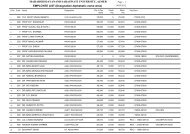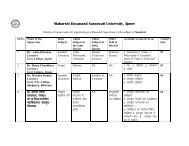ba pt II - Maharshi Dayanand Saraswati University, Ajmer, Rajasthan
ba pt II - Maharshi Dayanand Saraswati University, Ajmer, Rajasthan
ba pt II - Maharshi Dayanand Saraswati University, Ajmer, Rajasthan
Create successful ePaper yourself
Turn your PDF publications into a flip-book with our unique Google optimized e-Paper software.
compulsory and contains 10 questions at least three questions from each unit,<br />
each question is of two mark (20 words). Part -B (20 marks) is compulsory and<br />
contains five questions at least one from each unit. Candidate is required to<br />
attem<strong>pt</strong> all five questions. Each question is of four marks (50 words). Part-C (30<br />
marks) contains six questions two from each unit. Candidate is required to attem<strong>pt</strong><br />
three questions one from each Unit. Each question is of twenty marks (400 words).<br />
Unit I<br />
Historical Background and the Coustitution<br />
Politics : Main Currents of the National Movement-Moderates, Extremists,<br />
Gandhian , Revolutionary<br />
Constitutional : Govt. of India Act, 1909; Govt. Of India 1919- with special reference<br />
to Diarchy, Govt. of India Act, 1935 with special reference to Provincial Autonomy<br />
The Constituent Assembly - Origin, Organisation and functioning; The Main<br />
Characteristics of the Indian Constitution; The Constitution Amendment Process,<br />
The ideological elements-Preamble, Fundamental Rights, Directive Principles<br />
of State Policy, Fundamental Duties and Secularism<br />
Unit <strong>II</strong><br />
The Union and State Government<br />
President - Election, Position, Powers and Functions, Council of Ministers and<br />
Prime Minister - Position and role.<br />
Parliament - Organisation Power and working of Lok Sabha and Rajya Sabha,<br />
Modes of Relationship between the two houses.<br />
The Supreme Court - Organisation and jurisdiction, Judicial Review, Judicial<br />
Activitism, Conflict of supremacy between the parliament and supreme court.<br />
The State Government<br />
Governor - Position and role, the Council of Ministers and Chief Minister, the<br />
State legislature.<br />
The Federal System - The need and nature of the federal system, Centre-State<br />
relations, Areas of Tension and demand for autonomy.<br />
Unit - <strong>II</strong>I<br />
Dynamics<br />
The Party System, Political Parties - National and Regional, The Election<br />
Commission, Electoral Reforms and Voting Behaviour.<br />
Determinants of Political System :<br />
(a) Economic - Class and Poverty<br />
(b) Sociological : Caste, Religion, Region, Language, Gender and terrorism<br />
(c) Political - Political parties and pressure groups.<br />
Selected Readings:<br />
1. A .Ray: Tension Areas in Indian Federal System<br />
2. A. Kohli (ed.) : The Success of India’s Democracy, Cambridge, Cambridge<br />
<strong>University</strong> Press, 2001.<br />
3. A. Kohli : Democracy and Discontent : India’s Growing Crisis of Governablitity,<br />
Syllabus/B.A. Part -<strong>II</strong> / 61 62 / Syllabus/B.A. Part -<strong>II</strong><br />
Cambridge, <strong>University</strong> Press, 1991.<br />
4. A.Granville: The Indian Constitution Cornerstone<br />
5. A.R.Desai, (Ed.):Peasant Struggle<br />
6. Alen Glend :Fundamental Rights in India<br />
7. Bidyut Chakra<strong>ba</strong>rty & Rajendra Kumar Pandey : Indian Government and<br />
Politics, Sage Publications, New Delhi, 2008<br />
8. D. D. Basu : An Introduction to the Constitution of India, New Delhi, Prentice<br />
Hall, 1994.<br />
9. D.S. Smith: Indian as a Secular State<br />
10. G. Austin : The Indian Constitution: Corner Stone of a Nation, Oxford<br />
<strong>University</strong> Press, 1996.<br />
11. G. Austin : Working a Democratic Constitution : The Indian Experience,<br />
Delhi, Oxford <strong>University</strong> Press, 2000.<br />
12. H.C.Alexandrawicz: Constitutional Government in India<br />
13. J.C.Johari :Indian Political System (English &Hindi)<br />
14. Kashyap : Our Parliament, New Delhi, National Book Trust, 1992.<br />
15. Kodesia: The Problem of National Integration<br />
16. L.M.Singhvi: Union-State relations in India<br />
17. M. Chadda : Ethnicity, Security and Separatism in India, Delhi, Oxford<br />
<strong>University</strong> Press, 1997.<br />
18. M.V.Pylee: Constitutional Government in India<br />
19. Morris Jones:The Government and Politics in India<br />
20. Mynor Weiner: State Politics in India<br />
21. N.D.Palmer: The Indian Political System<br />
22. N.K.Bose: Problem of National Integration of a Nation<br />
23. P. Brass : Politics of India Since Independence, Hydera<strong>ba</strong>d, Orient Longman, 1990.<br />
24. R. L. Hardgrave : India : Government and Politics in a Development Nation,<br />
New York Harcourt, Brace and World, 1965.<br />
25. Rajni Kothari: Politics in India<br />
26. Rajni Kothari, (Ed.): Party System and Election Studies<br />
27. U. Baxi : The Indian Supreme Court and Politics, Delhi, Eastern Book Company,<br />
1980.<br />
28. U. Baxi : Crisis and Change in Contemporary India. New Delhi, Sage.<br />
29. Neiner Myeon : Party Politics in India, The Development of Multiparty<br />
System, D.K. Publishers Distributors, New Delhi.<br />
30. U.C. Jain : Encyclopedia of Indian Government and Politics in 10 Vols, Pioneer<br />
Publishers, Jaipur<br />
31. K.C. Markanandan :Centre State Relations, D.K. Publishers Distributors, New Delhi.<br />
32. R.C. Aggarwal : Indian Government and Politics (India Political System) 5 th<br />
ed. , S.Chand and Company, New Delhi, 2000.<br />
33. C.P. Bhambri : Indian Politics since Independence (2 Vols.) Metropolitan<br />
Books ,New Delhi.


